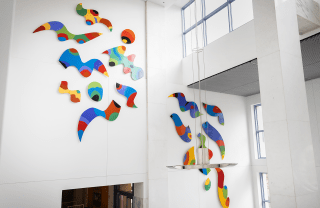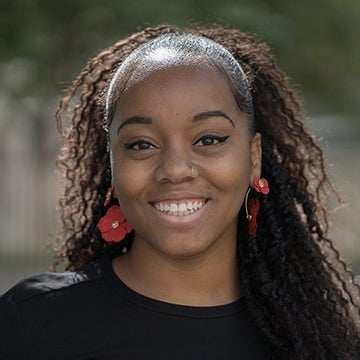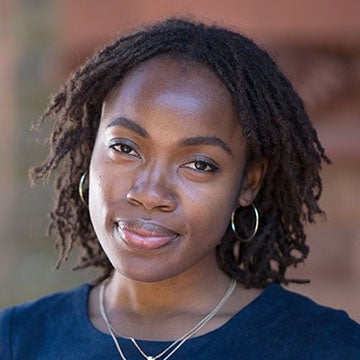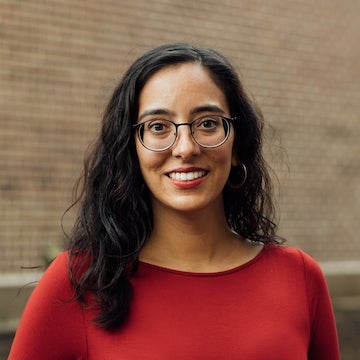Three Annenberg Doctoral Candidates Awarded 2024 Sachs Program Grants
Azsaneé Truss, Cienna Davis, and Melissa B. Skolnick-Noguera were all awarded funding for creative projects from the Sachs Program for Arts Innovation.

Photo Credit: Eric Sucar
The Sachs Program for Arts Innovation at the University of Pennsylvania has announced that Annenberg School doctoral candidates Azsaneé Truss, Cienna Davis, and Melissa B. Skolnick-Noguera are awardees of its 2024 Student Grants.
The Sachs Program offers grants to support students in their creative pursuits and promote broader access to the arts. These grants are designed to empower students to develop and lead ambitious projects, ranging from performances and exhibitions to collaborative events.
Azsaneé Truss

Truss’s project, entitled "Conspi(racism)," is a short film exploring the culturally specific roots and logics of conspiracy theorizing amongst Black Americans via glimpses of an intimate conversation at a listening party and an exploration of the archives of the crack epidemic.
Her film will be grounded by a listening party: a gathering where Black people will listen to music related to the crack conspiracy and have discussions elicited by each song. Using the content from conversations, Truss plans to drive a deep dive into archives related to the crack epidemic and its surrounding conspiracy.
The project will include explorations of community-based sites of preservation throughout Philadelphia, such as The Colored Girls Museum, the KyKy Archives, and the Black Culture Museum.
At Annenberg, Truss's dissertation project studies conspiracy theorizing in Black American art and media. Truss is academically committed to understanding what sorts of knowledge exist outside of the written word, attempting to understand how multimodal forms might have more to offer in the way of liberatory knowledge production processes.
Cienna Davis

Davis’s project, "(Digit)al Dread," considers both touch and technology as methods to explore Black hair care practice.
Davis explains: “The project will result in a physical assemblage that uses Black hair care practices (braiding, twisting, locking, etc.) to merge afro-hair with various items and materials associated with electronic technologies and diasporic memories. The assemblage will be interactive, allowing Black femmes to use their own hair to plug into the installation — hearing stories, touching memories, and smelling scents that invoke the kind of sacred, communicative technology of Black hair care practice.”
The project has three phases: a visit to the e-waste village Agbogbloshie in Accura, Ghana where Davis will collect e-waste materials and connect with local laborers and hair braiders; field work in Berlin with fellow artists that will include a focus group on Black hair care in the 21st century; and an installation at the opening of the Transnational Feminist Networks Symposium that Davis is organizing with fellow graduate students at Annenberg.
At Annenberg, Davis utilizes performance ethnography to engage Afro-textured hair as language and communication network. She is interested in digital embodiment and transnational Black feminist modes of techno-vernacular creativity.
Her research examines the role of digital technology and the Internet in transforming processes of racialization and racial identity formation.
Melissa B. Skolnick-Noguera

Skolnick-Noguera's project, "Philadelphia Artists & Culture Keepers: A Digital Media Project," will highlight the stories of Latine and Black artists who use their creative work alongside social change in the Philadelphia region.
At Annenberg, she investigates the cultural arts network in Philadelphia, and how praxis and discourse impacts politics and policy. While doing her dissertation research, she saw a need to document the creative projects and visionary solutions BIPOC artists are developing that mainstream media institutions fail to highlight.
As a Latina daughter of an immigrant, she is part of communities that are often at the forefront of arts/culture and social change, yet these narratives are often invisibilized, she says.
Skolnick-Noguera sees this project is an opportunity to make research more accessible outside of academia and as a tool for advocating for more sustainable cultural equity in the Philadelphia region.
"Philadelphia Artists & Culture Keepers" is part of a wider digital archival project Skolnick-Noguera is working on that will visually show the artists in their element, providing a cinéma vérité look into their environments.


